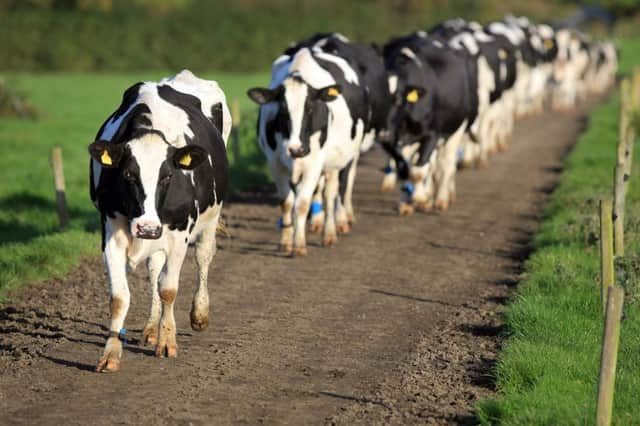Dale Farm calls for more milk


“It’s a simple case of servicing our growing customer requirements,” said a Dale Farm spokesperson.
“The launch of the milk reduction scheme comes as DAERA reports that year-on-year milk production in Northern Ireland is down 6.0% in July and EU-wide production fell 1.6% in June. Dale Farm has made substantial investments in processing capacity, especially our state-of-the-art cheese and whey facilities.”
Advertisement
Hide AdAdvertisement
Hide AdThe spokesperson added: “We’ve reviewed the EU reduction scheme for all farmer production systems. We estimate the scheme is not cost effective for autumn and all-year round calving systems as producers would lose money. For spring calvers, the outcome is breakeven if they can reduce labour costs significantly.
“However, if a producer has already reduced their milk production substantially, with no likelihood of coming close to last year’s litres, they may be best served applying for this scheme. For all other producers, regardless of calving pattern, reducing production to avail of the scheme is not profitable and they would be better off producing the milk.
“More milk enables Dale Farm to improve our ability to pay a better milk price.”
Meanwhile, Farm Minister Michelle McIlveen has confirmed the details of the €150million European Union aid scheme to incentivise farmers to voluntarily reduce their milk deliveries.
Advertisement
Hide AdAdvertisement
Hide AdThis is part of a €500million aid package, agreed at the Agri-Fish Council in July, designed to encourage farmers to reduce milk production to counter the over-supply situation and help restore prices. The EU is seeking to achieve a total reduction in milk deliveries of just over one million tonnes, compared with the same period last year.
Farmers will be compensated if they reduce their production in any one of four separate three-month periods between October 2016 and March 2017. The scheme is expected to start on 11 September 2016 when the legislation comes into operation. Applications for aid from Northern Ireland dairy farmers may be submitted to the Rural Payments Agency (RPA) who will administer the scheme on behalf of all UK regions. Applications for the first reduction period, running from October to December 2016, must be submitted to the RPA by 21 September 2016.
The Minister said: “The dairy sector in Northern Ireland has been experiencing a prolonged period of severely depressed prices and our local farmers have been particularly affected. I am pleased that our dairy farmers can now apply for EU aid to support a reduction in their milk deliveries to processors should they choose to do so.
“I would encourage dairy farmers to consider the detail of the scheme rules carefully and to ensure that they have the necessary supporting documentation readily to hand, should they decide to submit an application.”
Advertisement
Hide AdAdvertisement
Hide AdThe remaining €350million of the July 2016 financial package is for EU Exceptional Adjustment Aid which has been allocated to Member States to spend on measures that foster the economic sustainability of farms and that contribute to market stabilisation. The UK aid envelope is around €30million.
Minister McIlveen added: “I am committed to supporting farmers in Northern Ireland at this difficult time and to helping build a strong, sustainable and resilient agri-food industry for the future. I have made the case for Northern Ireland to receive a significant share of the UK envelope of EU Exceptional Adjustment Aid. I am currently considering the options for how best to use our allocation and will make a further announcement about this aid at the earliest opportunity.”
In response, the Ulster Farmers’ Union has urged Michelle McIlveen to ensure funding from the EU Exceptional Adjustment Aid scheme benefits all of Northern Ireland’s livestock sectors. Speaking after a meeting with DAERA officials, UFU president Barclay Bell said it was important that the estimated £4.5 million of funding was used strategically and to maximum benefit for farmers and the industry as a whole.
“We outlined a wide and varied range of options but our members believe the focus should be on supporting animal health measures across all livestock sectors. We are looking at the bigger picture and believe the aid package should be implemented to provide genuine, lasting benefits to the industry. Animal health is a significant and often costly problem on farms, and while the funds are very limited, this is an opportunity to help farmers tackle some of the issues,” said Mr Bell.
Advertisement
Hide AdAdvertisement
Hide AdWhile there is the option for national governments to top-up the aid package from the EU, Mr Bell said the Union has already been told that this is unlikely to happen.
“Ideally, the EU money would be match funded and we have raised this previously in the meetings with both the Minister and her officials. However, we are realistic about the current economic climate and the financial pressures at Stormont. Our main focus is to maximise Northern Ireland’s share of the UK national envelope. This is critical if we are to have a well-funded scheme that can deliver a lasting legacy for farmers,” he said.
Mr Bell also welcomed the further detail released in relation to the EU voluntary milk reduction scheme element of this wider aid package and encouraged dairy farmers to find out more and to consider the scheme if it suited their business but did stress the very short application window involved.
Pressure is building on Minister McIlveen to seek the introduction of a national funding top up, which is allowed for under the terms of the Exceptional Adjustment Aid scheme.
Advertisement
Hide AdAdvertisement
Hide AdNorthern Ireland Farm Groups, incorporating Farmers For Action (FFA) and Northern Ireland Agricultural Producers Association (NIAPA), claim that this argument has been delivered in full in the form of Rural Support’s recently launched Report on ‘Health and Social Effects of the Agricultural Downturn in Northern Ireland.’
According to spokesman William Taylor, the report makes clear the case for Minister McIlveen to extract the match funding, thereby overriding any other demands on Northern Ireland funds.